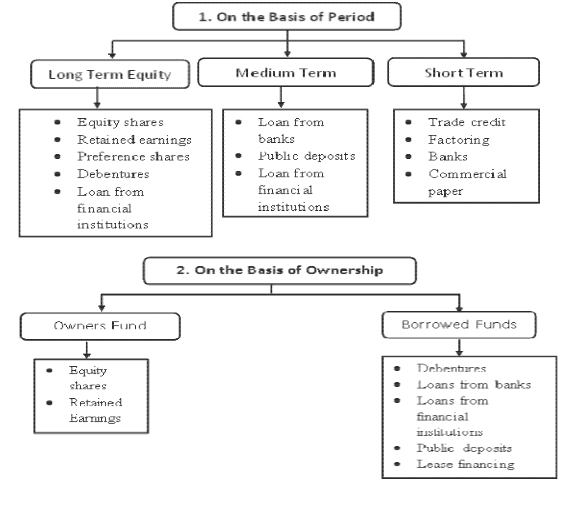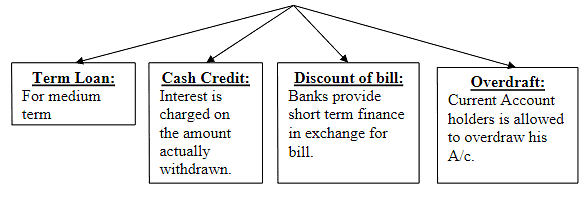Sources of Business Finance Chapter Notes | Business Studies (BST) Class 11 - Commerce PDF Download
CHAPTER - 7
SOURCES OF BUSINESS FINANCE
Introduction:
Business cannot be run without money. Funds required to carry out business is called Business Finance. This chapter throws light on how the finances for the business can be arranged, what are the sources of funding and what terms and conditions are governed with each type of funding.
Sources of Funds :

Share: The amount of capital to be raised from public is divided into units of equal values. These units are known as SHARE.
Equity (Ordinary) shares are those which do not carry any special or preferential rights.

Debenture: It constitutes the borrowed funds of the company. It is an acknowledgement of debt. Debenture capital may be called DEBT CAPITAL.

•Differences between Shares and Debentures

Public deposits:
Refers to the unsecured deposits invited by companies from the public. It can invite for a period of six months to 3 years. Public deposit cannot exceed 25% of its share capital & resources.

•Lease financing: A lease is a contractual agreement where by the owner of an asset grants rights to use the asset to other party for rent.
•Short term funds:
1. Trade credit: refers to the credit extended by one trader to another for purchasing goods or service. Small and new firms are usually more dependent on trade credit.
2. Factoring: It has emerged as a popular source of short term finance. It is a financial service where by the factor responsible for all credit control and debt collection from the buyers and provides protection against any bad debt losses to the firm.

3. Commercial Paper (C.P.): It is an unsecured promissory note issued by firm to raise funds for a short period says 90 days to 364 days. Only firms having good credit rating can issue the C.P.
Loans From Commercial Banks
Business can raise finance from commercial banks in the following ways

•Loans from financial Institutions:
Institutional finance means finance arranged from financial institutions other than commercial banks like IFCI, ICICI, IDBI, SFI etc.
•International Sources of Finance:
Financial institutions and investors in foreign countries can invest in the shares and debentures of Indian companies. Two main instruments used by Indian companies to tap international sources of finance are:

Factors affecting choice of Source of Funds

VSA (Very short Answer type questions ) (1mark)
1. What is commercial paper?
2. What is ADR?
3. What is meant by convertible debenture?
4. Explain the term ‘Factoring’?
SA (Short Answer type questions ) (3or 4marks)
1. Describe the various types of finance?
2. Explain three sources of owned funds.
3. Explain any two types of preference shares.
4. Explain the advantages of equity share.
LA (Long Answer type questions ) (5or 6marks)
1. Distinguish between Equity shares and Preference shares.
2. What are retained profits? Discuss their merits and demerits.
3. Explain the disadvantages of shares.
4. Explain the merits and demerits of public deposits.
HOTS
1. Name the capital invested in permanent assets.
2. What is self financing?
3. Name the agreement where by the owner of the asset grants another party the right to use the asset in return for a periodic payment.
4. Name the funds needed for day to day operations of business.
Gist of the Lesson:
•Finance is the life blood of business.
•Business finance is of three types – Long term, Medium term, Short term
•There are two sources of business finance – Owned funds, Borrowed funds
•Shares are of two types – Equity and Preference shares
•Retained profits refer to the undistributed profits which are re-invested in business.
•Debentures are creditor ship security.
•ADRS and GDRS are the main International sources of finance.
|
37 videos|142 docs|38 tests
|
FAQs on Sources of Business Finance Chapter Notes - Business Studies (BST) Class 11 - Commerce
| 1. What are the sources of business finance? |  |
| 2. What is the difference between short-term and long-term financing? |  |
| 3. How do businesses decide on the best source of financing? |  |
| 4. What are the advantages and disadvantages of debt financing? |  |
| 5. What are the advantages and disadvantages of equity financing? |  |

|
Explore Courses for Commerce exam
|

|


















